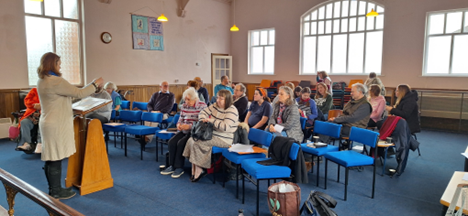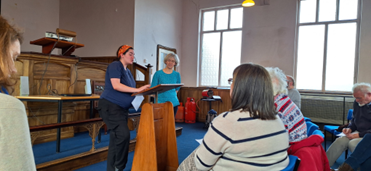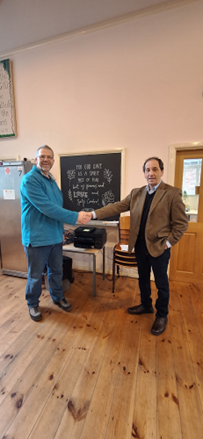<<<< Andy's message
In Parliament Square on Wednesday May 15th) , hundreds gathered to show their opposition to proposals to decriminalise abortion up to birth.
Our founder Andy Stephenson was there on the day and commented:
“I have never seen pro-life groups come together like this in all my life. There is nothing "magic" in unity. However, collaboration will hopefully help us have a greater impact. I am more confident today than I ever have been that this whole thing can swiftly pivot on a point away from the direction we've been going in for decades. Don't watch this space. Get in it and be a witness against evil.”
Multiple advocacy groups, charities and Christians gathered opposite the Houses of Parliament in London today to protest what could be the most significant change in UK abortion law since its legalisation in 1967.
Amendments are to be voted on in Parliament over the course of 15 May, which may “threaten to remove remaining legal protections from the unborn child at any stage of pregnancy”.
The day-long protest, which was organised at short notice and on a weekday, was nonetheless attended by hundreds – including figures such as Carla Lockhart, MP for Upper Bann in Northern Ireland, and Isabel Vaughan-Spruce whose arrest for silent prayer outside an abortion clinic in Birmingham was recently condemned by the United States government.
The rally was coordinated by a variety of cross-denominational, secular and independent organisations such as ADF UK, CBR UK, Christian Concern, CitizenGO, Good Counsel Network, March for Life, Rachel’s Vineyard, SPUC, Voice for Justice UK and 40 Days for Life.
Participants were handed free t-shirts and placards bearing the phrase “NO to abortion up to birth”. Additionally, a van with an LED screen bearing the image of a child in the womb continually drove past the entrance to the Palace of Westminster.
“Only 1 per cent of the British public agree with abortion up to birth,” campaigner Louis McLatchie reminded crowds assembled on Parliament Square, in the immediate shadow of both the Houses of Parliament and Westminster Abbey, over a loudspeaker.
This sentiment was echoed by Ruth Rawlins, an organiser of the event from the Centre for Bio-Ethical Reform UK, who took the time to speak to the Catholic Herald.
“What’s been beautiful about today is that people have laid aside their logos and laid aside their brands. This is not about any organisation. This is about saying no to abortion up to birth,” she said.
After revealing that the rally was “last-minute”, Ms Rawlins indicated that she was pleased with the turnout. Recently, her organisation joined with several others and went to Walthamstow in north London and Hull in east Yorkshire, where the constituencies of Stella Creasey MP and Diana Johnson MP respectively (the parliamentary sponsors of the amendments to decriminalise abortion to birth) are located.
“So we went and did a demonstration there and used images of living babies in the womb. Our message was to protect babies. There is no right to kill,” said Ms Rawlins.

“We asked for the public opinion and [asked] the people who are in those constituencies – you can see on our videos that people were not or it. They didn’t know that their MPs were fighting this. The public, the people on the ground, were really not for it. They were shocked to hear that their MPs were trying to push for abortion up to birth.”
Ms Rawlins insists that the Centre for Bio-Ethical Reform repeatedly finds when carrying out its work on the ground that there is public opposition to the extremity of recent proposals to further liberalise abortion – such as allowing women to “terminate” late-term pregnancies.
She remains hopeful about the possibility of convincing members of the public about the issue, citing the efficacy of her organisation’s work with showing images of babies living in the womb and images of aborted babies. The latter exhibits the brutality of the procedure and “expose[s] abortion for what it really is”.
“We find that when people see that, it changes everything,” Ms Rawlins added, ” – because now it’s not an abstract euphemism. Now they can see with their eyes that abortion is a violent act that kills an innocent human being, and many people with functioning consciences will change their mind on the issue.”
However, when asked whether she thought the extremity of the proposed legislation could cause a backlash there was more reluctance to show optimism. Instead, she pointed to Caroline Ansel MP’s amendment which will seek to lower the limit for windows in which women can pursue an abortion as a source of hope.
Ms Rawlins also warmly recalled her fruitful interaction with a group of young visitors to Parliament Square earlier in the morning who were called the “Brilliant Students”, a collection of precocious schoolchildren on a visit to the capital.
“These were some gifted students. And I was able to speak to them,” she said, grateful that their teacher allowed the exchange. “They were debating – a lot of them were quite pro-choice – but they were not for abortion up to birth. I was encouraged by speaking to those young people as they were willing to debate and think about the issue.”
Ms Rawlins expressed concern that abortions up to birth are de facto taking place anyway after the introduction of the pills by post scheme and revealed that the issue is a personal one to her as she had her child at a young age. The Catholic Herald next spoke to a representative from ADF UK.
“The thing about this vote is that it’s so, so extreme,” Paul Sapper, communications officer for ADF told the Catholic Herald. “Stella Creasey… is very extreme on this question. And what we’ve seen is that it’s galvanising a lot of support from people who might not be against abortion in all circumstances. But they are against this because they see how inhumane it really is.”
“We’ve got two upcoming votes. One of them is an attempt to decriminalise abortion up to birth. We are completely against that at ADF as it would lead to many more lives being ended in the womb. It would be a vast offence to human dignity and the right to life.
“There is however a second amendment, which if passed would be good as it will lower the abortion limit from 24 weeks to 22 weeks. Obviously we all want abortion to be banned in every single situation… however as a stepping stone onto that, lowering it from 24 to 22 weeks would be a movement in the right direction. Lives would be saved if that vote does pass,” he disclosed.
Mr Sapper was greatly encouraged at the way in which the Bishops of the Catholic Church in particular – such as Bishops Mark Davies and John Sherrington – had mobilised and voiced “strong and good statements” on the issue.
Bishop Mark Davies meanwhile encouraged the faithful to keep hope. “Fatigue can sometimes endanger the pro-life cause,” he counselled.
Instead, Bishop Davies encouraged Christians to continue to recall people to “the faith and moral vision on which our society was built, and our laws securely founded”.
“This has become our tireless task in the early 21st Century,” he said, “to… give witness to the precious value of every human life in the light of Him who was conceived, born, died and rose again for us.”

































